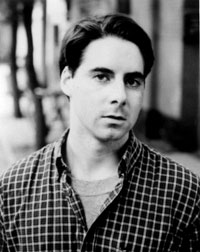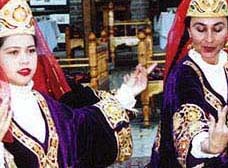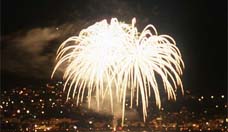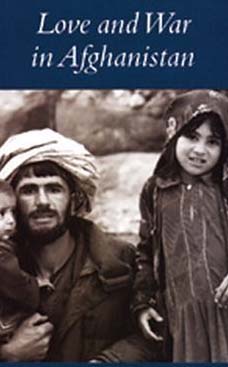
Throughout his stay Hessler encountered mocking shouts of "Halloo" and "waiguoren" (foreigner) when he went for walks through the city. Symptomatic of ethnic prejudice and unfamiliarity with foreigners (Hessler and the other Peace Corps volunteer in Puling were the first American residents in half a century) rather than of any cultural difference reflected in language, these catcalls nevertheless helped form Hessler's linguistic identity in Puling, his "self-in-translation." As he portrays it, they acted as a spur to his study of Mandarin; by the end of his first year, he no longer found them so troubling, as by then he could speak the language with some confidence and was on friendly terms with a wide range of people-vendors, tradesmen, free-lance photographers, and teashop waitresses-who humored his desire to practice Chinese and extended his Chinese-speaking self.
A sense of the painful and conflicted aspects of becoming recognizable to others in a new language also characterizes American author Peter Hessler's memoir River Town: Two Years on the Yangtze
ANGLOS ABROAD: MEMOIRS OF IMMERSION IN A FOREIGN LANGUAGE
Jan 1, 2005
Biography
[Excerpt]
A sense of the painful and conflicted aspects of becoming recognizable to others in a new language also characterizes American author Peter Hessler's memoir River Town: Two Years on the Yangtze. River Town gives an account of the period from 1996 to 1998 that Hessler spent in Puling, a remote town in the Chinese province of Sichuan, where he taught English literature as a Peace Corps volunteer. Central to the narration is his experience of gradual immersion in Chinese language and culture, a process portrayed as complex, incremental, marked by frequent chagrin and loss of face, and sometimes anger, if also warmth and the emergence of genuine friendships.
Throughout his stay Hessler encountered mocking shouts of "Halloo" and "waiguoren" (foreigner) when he went for walks through the city. Symptomatic of ethnic prejudice and unfamiliarity with foreigners (Hessler and the other Peace Corps volunteer in Puling were the first American residents in half a century) rather than of any cultural difference reflected in language, these catcalls nevertheless helped form Hessler's linguistic identity in Puling, his "self-in-translation." As he portrays it, they acted as a spur to his study of Mandarin; by the end of his first year, he no longer found them so troubling, as by then he could speak the language with some confidence and was on friendly terms with a wide range of people-vendors, tradesmen, free-lance photographers, and teashop waitresses-who humored his desire to practice Chinese and extended his Chinese-speaking self.
The memoir evokes vividly Hessler's struggle to learn Mandarin. In his private classes with Teacher Liao, a lecturer in m\odern Chinese at his college, he is dismayed by her emphasis on what he gets wrong, the number of times she says "Budui!" (not correct). He comes away wondering "had a human being ever compressed more wrongness into a single hour?" (67). When he reads a passage aloud without making a mistake he looks up expecting affirmation, but encounters a bored expression on Teacher Liao's face. After all, he has only done what a child could do. He begins to experiment with new words that he teaches himself between classes, and imagines he can see her "flinching with unwilling admiration," but again, she says "Budui!" correcting the part that was wrong.
In hindsight, Hessler recognizes that his desire to have his "ego soothed" with praise was an expectation created by his American education, and notes how in his own English classes in Puling, when his students made mistakes he automatically praised them for their effort, unable to modify his teaching style even after realizing that they found his praise meaningless. The impulse to encourage, to build up students' self-esteem, was too ingrained a part of his educational self.
Hessler writes of an "unhealthy note" brought out in his relationship with Teacher Liao by the historical lessons in his language textbook:
Often there was a definite tension as we prodded each other carefully. When the textbook discussed the Opium Wars, she quietly pointed out that America had also benefited from the unequal treaties that were forced upon the Chinese, and she lingered over the description of the waiguoren looting and burning the Summer Palace. (146)
When Teacher Liao claimed that China had become self-sufficient in oil, he would counter with the point, gleaned from Newsweek, that China had become a net oil importer in 1995. While unconvinced, she was evidently annoyed by the readiness of his statistics. Hessler brings out the defensiveness of his rejoinder: "I had never been a patriot, and certainly I had never been patriotic about oil, but things were different now-I was a waiguoren, and I was developing a waiguoren's sensitivity to any sort of slight" (146). He further relates his position in these uncomfortable exchanges to an aspect of the language that he was learning: the Chinese use personal pronouns when they speak of national affairs-it's "our China" and "your America." I found this to be a small but critical quirk in the language; every political discussion quickly became polarized, and every aspect of America-both its successes and its failures-became my personal affair. (147)
Before coming to China he had not thought of himself as particularly American; speaking the new language drew him reluctantly into such an identification, positioning him through the use of a pronoun that there was no way of avoiding. In drawing out the significance of what might strike others as a minor fact of language, Hessler shows how this use of the possessive pronoun exemplifies a particular way of thinking about nationality, and how speaking Chinese, even as an outsider, involves taking on that way of thinking, however ambivalently.
Hessler writes of his growing respect and liking for Teacher Liao over the two years of their lessons, which stem not from any rapprochement over politics but from a clearer sense of her as a person, something that is in part enabled by his more fluent Chinese. At a farewell dinner that she holds for him and the other Peace Corps teacher, another guest, a college administrator, makes fun of Hessler's Chinese, "speaking with patronizing slowness," until finally Teacher Liao snaps: "Ho Wei"-the Chinese name Hessler was assigned during his Peace Corps training-"understands what you're saying. . .
We studied that a year ago" (389). Hessler feels that the same "fierce pride" that characterized her stance in defending China is now being extended to him as a student. At the time of their final class Teacher Liao is eight months pregnant and insists on continuing a lesson in spite of an attack of morning sickness. Returning from the bathroom she smiles, blushes, and says "Duibuqi" (I'm sorry), and when asked if she'd prefer to cancel the class maintains "firmly": "'It is nothing. Now, please continue what you were saying before I left.'" Hessler pays tribute to her "quiet pride and toughness," which had "gone from being infuriating to something whose consistency was admirable and even comforting" (391).
The memoir's account of these Mandarin classes conveys both curiosity about, and respect for, a different cultural outlook, one according to which Hessler's own understanding of student-teacher relations looks foolish. At the same time, the narrative voice seems never to surrender a critical instinct and a sense of the irony inherent in cross-cultural encounter. The same qualities characterize Hessler's writing about his English literature classes, where the medium of communication was English but where, culturally, he was still positioned very much as an outsider. He quotes excerpts from several of his students' essays and class journal entries in English, commenting on him and the other Peace Corps teacher, Adam Meier, or tentatively expressing criticism of the West.
Students clearly availed themselves of the opportunity to convey things to Hessler that might have been harder to say to his face, given a student-teacher dynamic marked on the one hand by traditional, Coiifucian-derived overtones of respect, and on the other by wariness towards a foreigner from the capitalist heartland of America. One essay, by a student who chose the English name "Catherine," compares "girls in the East" to "girls in the West," concluding that the former are "elegant, refined and kind" and the latter "lead a loose life" (21). Hessler describes Catherine as "a lovely girl, a quiet student with eager eyes and a friendly smile," towards whom he "couldn't be harsh," simply noting on her essay that he had three sisters in America-a note which drew an apology from her.
Another student's journal entry, written in response to seeing Peter play Frisbee with Adam Meier in the college plaza, renders their "lazy game . . . Olympian": "How wonderful it looked! The Frisbee was like a red fire, flying person to person between the two men. I have seen it for a long time. Foreigners are so versatile" (16-17). An essay Hessler singles out as his "favorite," by a student calling himself Richard and titled "Why Americans Are So Casual," offers a "less heroic" description:
I'm a Chinese. As we all know, the Chinese nation is a rather conservative nation. So many of us have conservative thinking in some degree. I don't know whether it is bad or good.
Our foreign language teachers-Peter and Adam-came to teach us this term. It provides a good opportunity of understanding the American way of life. In my opinion, they are more casual than us Chinese people. Why do I think so? I'll give you some facts to explain this.
For example, when Mr. Hessler is having class, he can scratch himself casually without paying attention to what others may say. He dresses up casually, usually with his belt dropping and dangling. But, to tell you the truth, it isn't considered a good manner in China, especially in old people's eyes. In my opinion, I think it is very natural. (17)
We're given an impression here of an observer watching Hessler curiously and critically, albeit expressing his criticism in a diplomatic fashion-in some respects the reverse of a Western observer commenting on a foreign culture. But we also hear someone reflecting on the cultural dimension of his own ways of speaking and behaving, perhaps for the first time.6 Unlike the selfmocking that Pratt analyzes in Swedish naturalist Andreas Sparrman's eighteenth century account of traveling in the Cape colony, which she argues reinforces the superiority of his scientific knowledge vis--vis the "peasant knowledge" of Afrikaners and KhoiKhoi alike (55-56), or the self-ironizing of contemporary travel writers Newby and O'Hanlon, which Holland and Huggan similarly interpret as a disingenuous means of cultural self-authorization (33-36; 78-81), the humor of Hessler's quotations from his students' essays is sparked by the friction between his own implied self-perceptionas normal-and the unexpected way they read him, transforming him in his own eyes.










